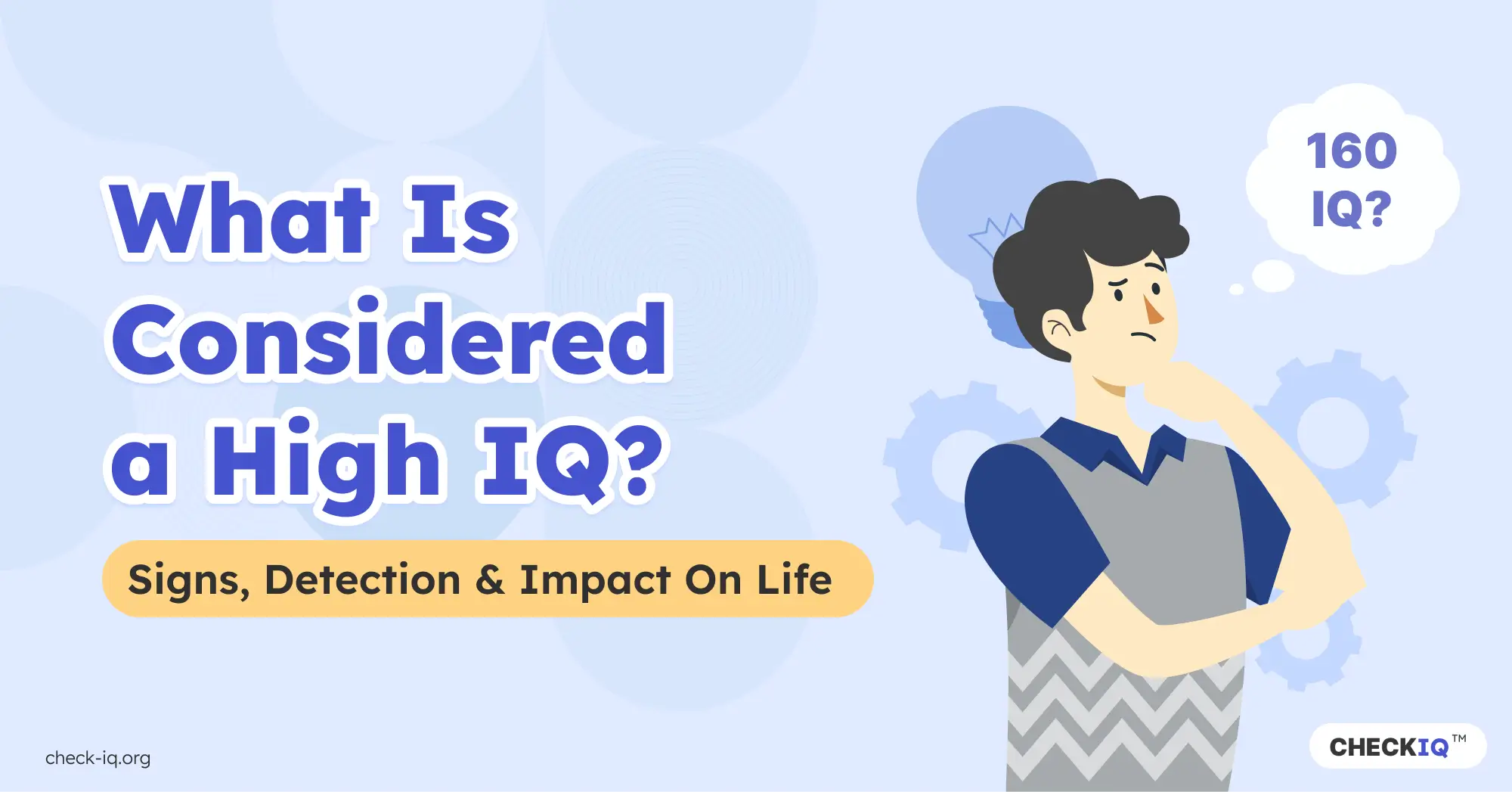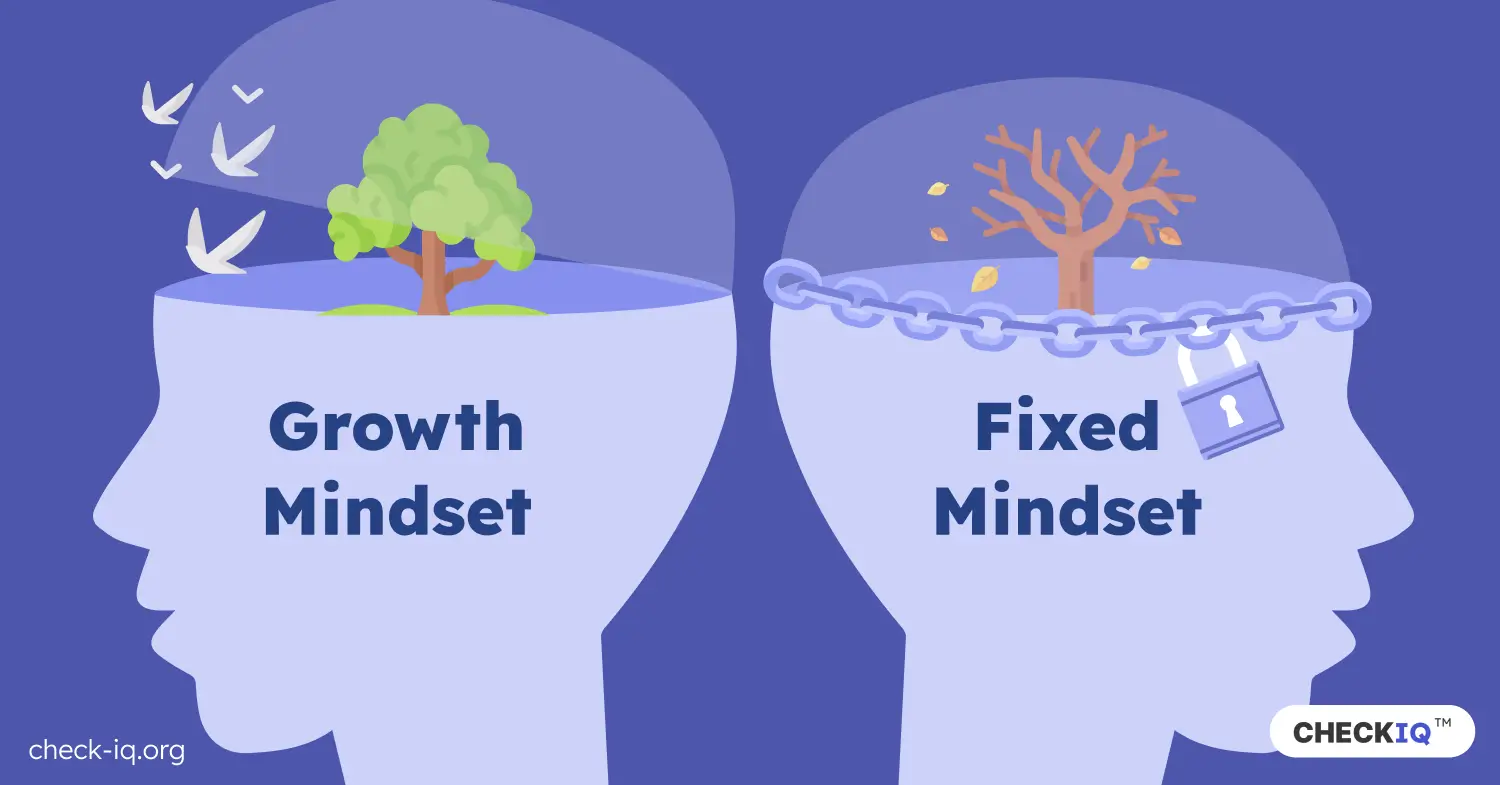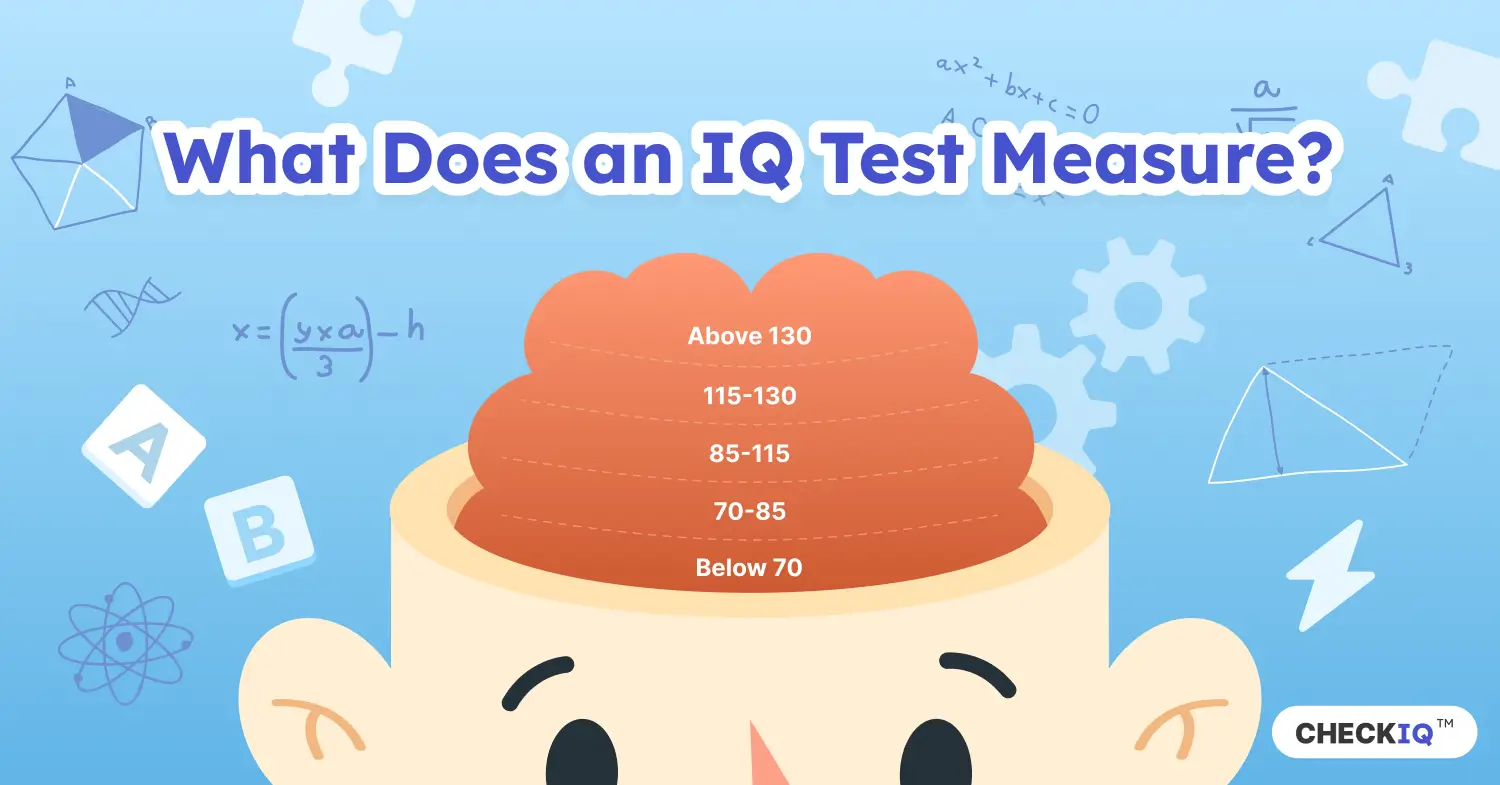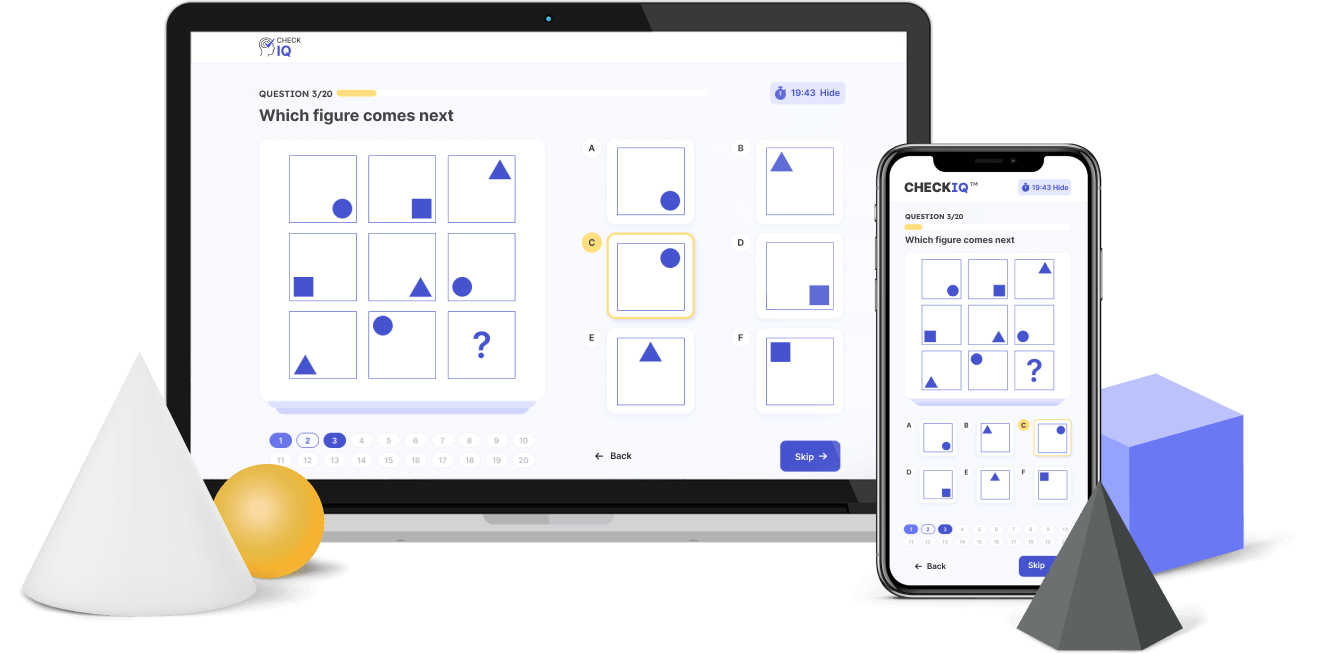Intelligence has fascinated humans for centuries, leading to the development of various tools and methods to measure it. One of the most well-known measures is the Intelligence Quotient, or IQ. But what exactly is considered a high IQ, and how does it impact a person's life? This article explores the definition of IQ, what constitutes a high IQ, and its potential implications.
What is Considered a High IQ?
Understanding IQ
IQ, or Intelligence Quotient, is a score that measures cognitive abilities. It reflects how well you solve problems, think logically, understand abstract ideas, and learn efficiently. To be more specific, it’s a measure of your fluid intelligence, which is your ability to think quickly and solve new problems, and crystallized intelligence, which is your knowledge and skills gained through experience and education.
The average IQ score is set at 100, with most people – 68% to be exact or around two-thirds – scoring between 85 and 115.
The IQ scores follow a bell curve distribution, also known as a normal distribution. In this curve, the peak represents the average score of 100, meaning that the majority of people score around this number.
As you move away from the peak, the number of people scoring lower or higher decreases.
Lower scores are represented on one side of the bell curve, indicating below-average thinking and reasoning skills, while higher scores are on the other side, indicating above-average thinking and reasoning skills.
Let’s go through a few examples to make it clearer:
- 50% of people have an IQ score lower than 100
- 50% of people have an IQ score higher than 100
- 16% of people have an IQ higher than 115
- 16% of people have an IQ lower than 85
- 2% of people have an IQ higher than 130
- 2% of people have an IQ lower than 70
There are several IQ classifications, such as the Wechsler and the Stanford-Binet scales. Each comes with its own definition of ranges and classifications. For example, in the current Wechsler classification, an IQ score of 130 and above corresponds to a “Very Superior IQ,” while in the Stanford-Binet classification, the highest IQ range is 140 and above, referred to as “Very Gifted.”
A reliable 100% adaptive online IQ Test. Get your IQ score immediately.
Start My IQ Test
IQ ranges according to different classification systems
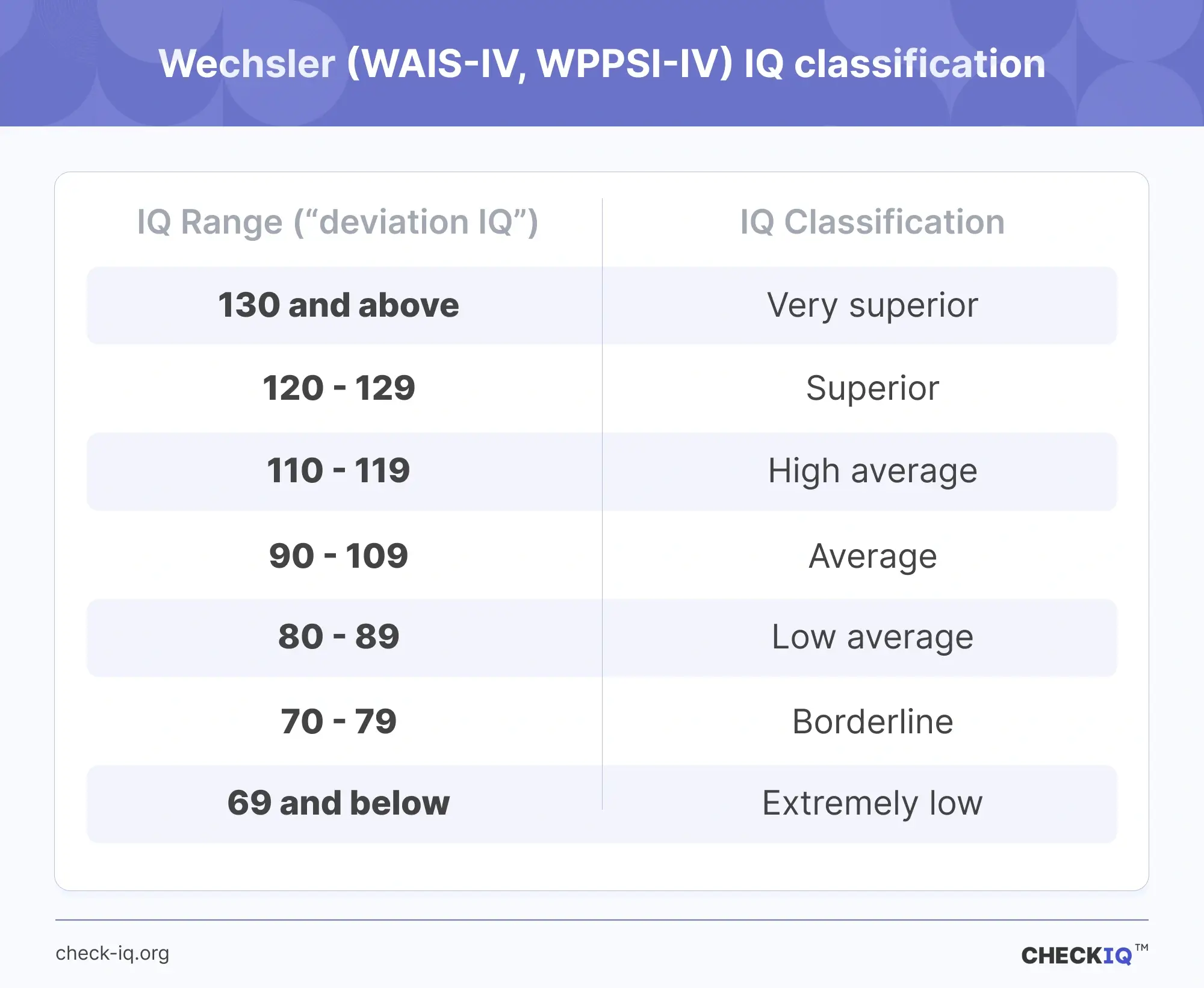
- Weiss et al. 2006, Table 5 Qualitative Descriptions of Composite Scores
- Sattler 2008, inside back cover
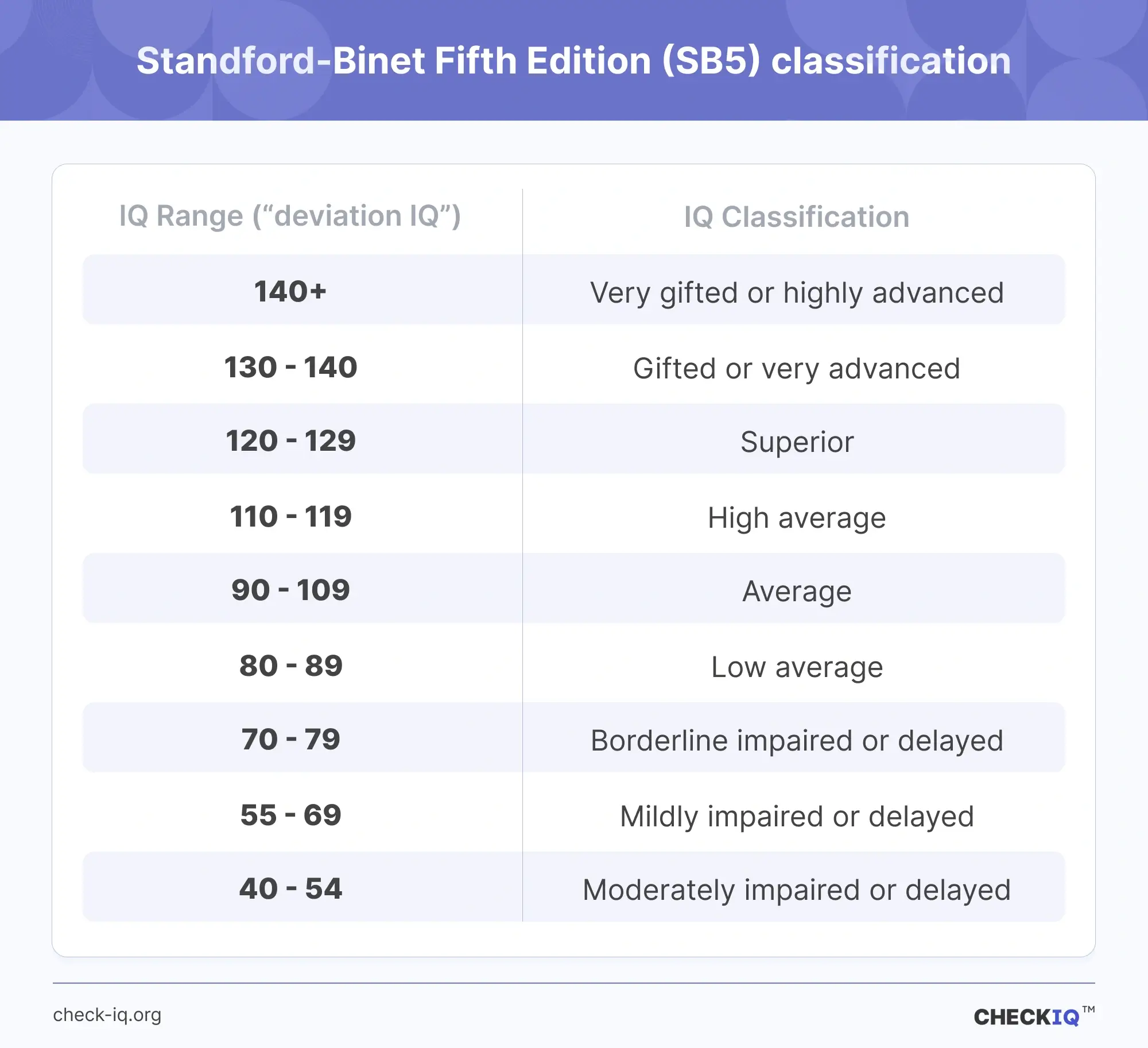
- Kaufman 2009, p. 112
- Sattler 2008, inside back cover
Now that we know what an IQ is and how it varies across the population, let’s understand what a high IQ is.
What’s a high IQ?
A high IQ means your score is higher than most people’s. An IQ score of 130 is considered high and it places you in the top 2% of test takers. This is also the score needed to join high-IQ societies like Mensa.
A score above 140 is considered exceptionally high, achieved by fewer than 0.4% of the population, or one in 261 people. This score grants access to more exclusive high-IQ societies such as Intertel.
High IQ vs. genius
The term "genius" is often confused with having a high IQ, but there's more to it. Scoring high on an IQ test means outperforming most people, but true genius also requires creativity and innovative thinking. For example, Albert Einstein is considered a genius not just for his high IQ but for his groundbreaking work in physics.
In 1916, American psychologist Lewis Terman set the IQ for "potential genius" at 140 and above, which is seen in about 1 in every 250 people. In 1975, another psychologist, Leta Hollingworth, suggested that a true genius should have an IQ over 180, found in only about one in every two million people.
Based on this, we can come up with the following classification:
- High IQ: Over 130 (Top 2%)
- Genius-Level IQ: Over 145 (Top 0.1%)
- Extraordinary Genius: Over 180 (Top 0.00005%)
But in reality, real genius is harder to define than “high IQ”, as it’s not just about IQ. It also involves creativity, originality, and significant achievements.
What’s a genius IQ for a child?
Psychologists studying gifted children have found that more kids might qualify as geniuses than we expect. This suggests that our current IQ tests might not measure extreme intelligence perfectly. A "genius" in children often means they have great potential and creativity, not just high test scores. Nowadays, it's common to call these children "gifted" instead. Profoundly gifted children are in the top 0.1%, while moderately gifted children are in the top 10%.
What is the highest recorded IQ?
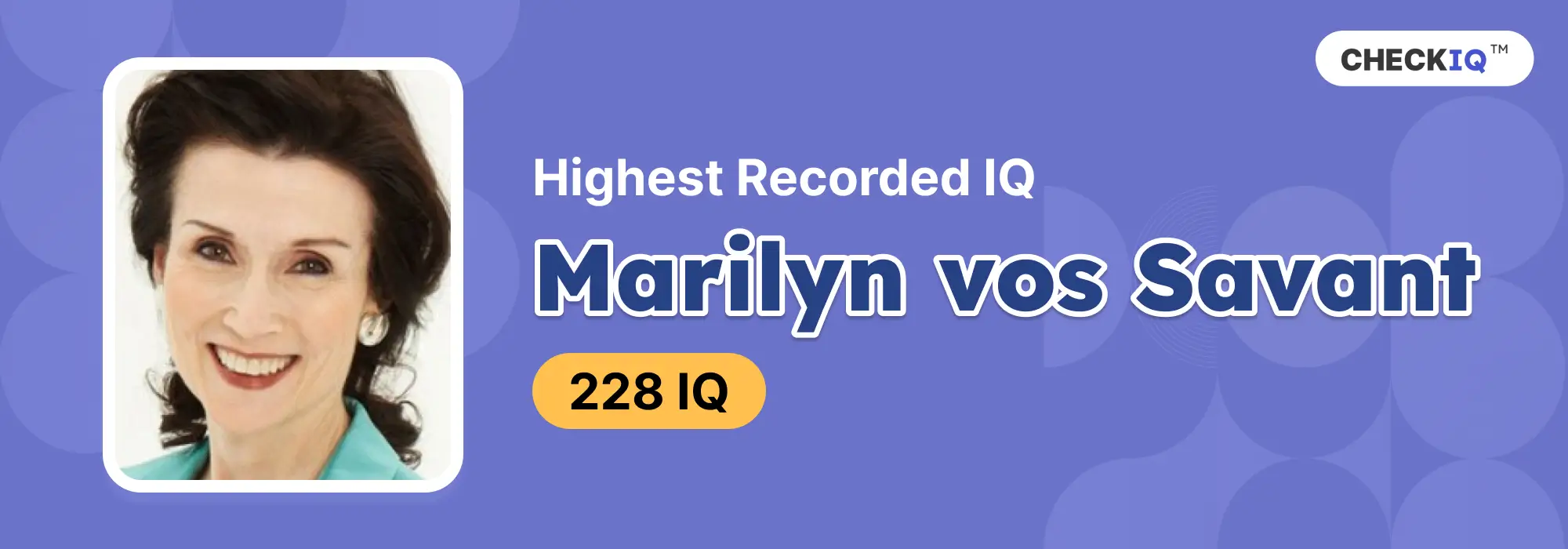
The highest recorded IQ is held by Marilyn vos Savant, who scored 228 on the Stanford-Binet test, one of the most popular IQ test types. Her extraordinary intelligence has been recognized in various fields, showcasing the potential of exceptional cognitive abilities. Marilyn vos Savant is known for her work as a magazine columnist, author, and lecturer. She has used her high IQ to contribute to discussions on a wide range of topics, including philosophy, mathematics, and logic, highlighting the diverse applications of exceptional cognitive skills.
Signs of High IQ
Identifying high IQ can be tricky because it manifests in various ways. We've covered the signs of high IQ in another article but here's a quick rundown:
Physical signs of high IQ
People with exceptional intelligence often have more grey matter in their brains, particularly in regions associated with memory, attention, and language, according to UCLA researchers. This part of the brain is crucial for processing information, controlling memory, attention, decision-making, and language skills. Additionally, individuals with high IQs exhibit enhanced neural connectivity, enabling more efficient communication between brain regions and allowing for faster, more complex thought processes.
Behavioral signs of high IQ
People with high IQs are better at noticing things around them more and they feel emotions deeply. This is called "superstimulability." This trait helps them better understand the feelings of others and their environment, leading to deep empathy and understanding. However, it can also make them feel overwhelmed in very busy or chaotic situations.
In his book "Genius: The Natural History of Creativity," Hans Jürgen Eysenck talks about how high IQ and creativity are connected. He says that many smart people also have traits of creative geniuses, like being very sensitive and feeling emotions deeply.
Research by Angela M. Brant and her team shows that people with high IQs have brains that keep learning from their surroundings for a longer time. Most people’s brains start to rely more on genetics to shape intelligence sooner, but high-IQ brains stay open to learning longer. This might be why they think deeply and understand emotions well. Their brains take in more from the world around them, which boosts their cognitive and emotional awareness.
Supporting this idea, a study by American researchers found that people with high IQs, often called "hyper brains," also have "hyper bodies." This means they are more likely to experience strong psychological and physical reactions. The study showed that highly intelligent people have a higher risk of mood and anxiety disorders, ADHD, autism spectrum disorders, and some physical illnesses related to the immune system. This connection between hyper brains and hyper bodies highlights the difficulties that can come with high intelligence.
Signs of high IQ in children
Gifted children often need a lot of mental stimulation. They learn quickly, ask tough questions, and show advanced skills in reading, math, or vocabulary early on. For example, a child who reads at age three or solves math problems before starting school might have a high IQ. They also understand deep emotions and complex moral issues and often have a unique sense of humor and creativity.
Research by French psychotherapist Laurence Vaivre-Douret shows that gifted children develop sensory, motor, and language skills earlier than other kids. Their brains process information faster, which helps them learn quickly and notice details others might miss. Studies also show that very gifted children, even those born prematurely, tend to grow faster as infants, indicating that genetics play a big role in their development.
However, this early development can sometimes lead to social and emotional challenges or learning disabilities that are often overlooked. Early identification and support can help gifted children reach their full potential and manage any difficulties. Providing a supportive environment helps them succeed not just intellectually, but also socially and emotionally.
Using IQ Tests to Detect High IQ
How IQ tests measure intelligence
For over a century, psychologists have used IQ tests to measure cognitive abilities. These tests assess skills like memory, problem-solving, mathematical ability, and language comprehension. They aim to provide a comprehensive overview of cognitive capabilities through various tasks that measure different types of intelligence.
Standardized IQ tests are given and scored by trained administrators. The score represents how you compare to your peer group in: language, reasoning abilities, processing speed, visual-spatial processing, memory, and math.
Evolution of IQ testing
The history of measuring IQ began with Alfred Binet in the early 20th century. Binet and his colleague, Théodore Simon, created the first practical intelligence test to identify children needing special education. This test introduced the concept of mental age and the calculation of an intelligence quotient. Over the years, these assessments have evolved significantly.
Alfred Binet's foundational work established the basis for all subsequent IQ tests. His approach to measuring intelligence was revolutionary, focusing on higher cognitive processes such as reasoning, understanding, and judgment. Today's IQ tests continue to build on Binet's principles, incorporating advances in psychology and educational theory to provide more nuanced assessments of intelligence.
The transition from Binet's early 20th-century tests to the sophisticated, multidimensional IQ assessments used today reflects the growing understanding of intelligence as a complex interplay of various cognitive functions. Modern IQ tests types, such as the Stanford-Binet Intelligence Scale, the WAIS (Wechsler Adult Intelligence Scale), and the WISC (Wechsler Intelligence Scale for Children), offer detailed insights into the strengths and weaknesses of an individual's cognitive profile, facilitating personalized educational and developmental interventions.
The different types of IQ tests
There is a wide variety of IQ tests available today, each designed with specific purposes and populations in mind. From the Stanford-Binet to the Wechsler scales, and newer intelligence tests like Raven's Progressive Matrices, the landscape of IQ testing is diverse.
These tests vary in terms of the skills they assess, the age groups they target, and the ways they score and interpret intelligence. For instance:
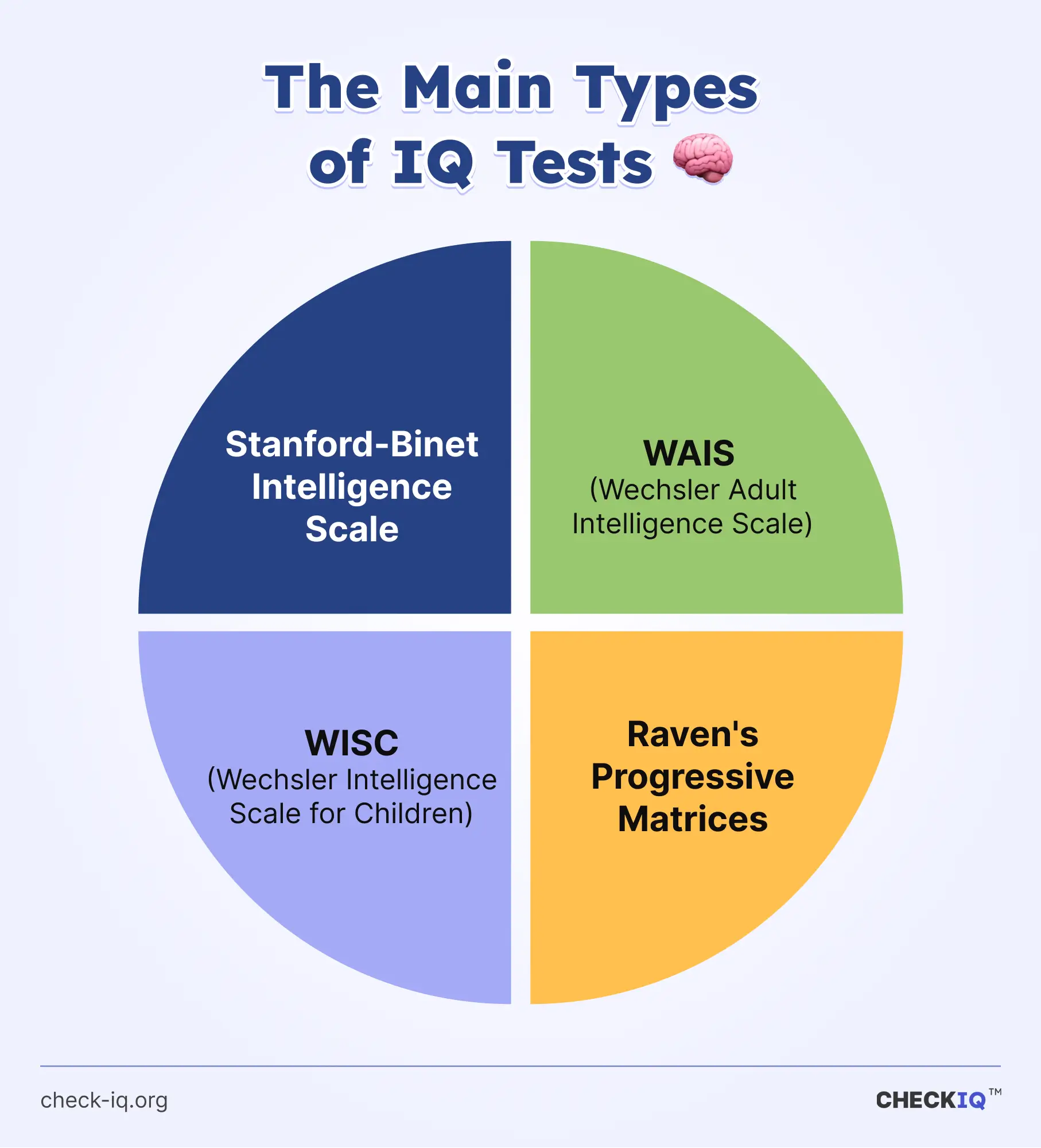
- Stanford-Binet Intelligence Scale: This test assesses five factors of cognitive ability: fluid reasoning, knowledge, quantitative reasoning, visual-spatial processing, and working memory.
- WAIS (Wechsler Adult Intelligence Scale): Designed for adults, it evaluates verbal comprehension, perceptual reasoning, working memory, and processing speed.
- WISC (Wechsler Intelligence Scale for Children): Tailored for children, it focuses on similar cognitive domains as the WAIS but is adapted for younger test-takers.
- Raven's Progressive Matrices: Known for its non-verbal nature, this test measures abstract reasoning and is often used to assess individuals with language or cultural differences.
Are IQ tests accurate?
IQ tests are designed to measure a range of cognitive abilities accurately. However, they have limitations and may not fully capture an individual's intellectual potential or creativity. Factors like test anxiety, cultural differences, and test design can affect accuracy. Therefore, IQ scores should be considered as one of many tools in assessing intelligence.
Advantages and Disadvantages of Having a High IQ
Advantages
Having a high IQ can be a wonderful gift. It helps you learn quickly and understand the world better, making learning a lifelong joy. People with high IQs often do very well in school and their jobs because they can easily understand complex ideas and solve problems in creative ways. For example, chess grandmaster Magnus Carlsen, who has an IQ of 190, shows how a high IQ can lead to amazing strategic thinking.
Disadvantages
But having a high IQ can also be tough. People with high IQs often experience what is known as the curse of high IQ. They often feel emotions very deeply and are very sensitive, which can lead to stress and feeling overwhelmed. They might feel different from their friends because they have different interests and ways of thinking. This can make them feel lonely. Their drive to succeed can sometimes cause burnout and frustration if they don't take care of themselves.
Research shows that people with high IQs are more likely to have psychological and physical problems, like mood disorders and anxiety. The "hyper brain/hyper body" theory suggests that their powerful minds can create extra stress and anxiety, affecting their overall well-being.
Can IQ Be Increased?
Yes, your IQ can be increased. There are several ways to do so:
Try new challenging activities
According to Harvard Health, trying new, challenging activities can help your brain grow and improve cognitive skills. For example, learning to paint, play an instrument, or swim can help keep your brain sharp. These activities encourage the brain to form new connections, making it stronger and more adaptable, even as you get older.
Balance “focus” and “unfocus” mode
Boosting brain power isn't just about working hard. The 'unfocus' network, or default mode network, is also essential for creativity and problem-solving. Activities that allow your mind to wander, such as daydreaming or going for a walk, can boost creativity and memory. Experts suggest mixing focused tasks with these relaxing activities to get the best results for your brain.
The role of physical exercise in brain health
Physical exercise is great for your brain. Dr. McGinnis from Harvard Medical School points out that moderate exercises, like walking or tai chi, can improve memory and thinking skills. This is because exercise helps the brain by growing new blood vessels and brain cells. For the best cognitive benefits, it's recommended to do moderate exercise for about 150 minutes each week.
The Flynn Effect
Historically, IQ scores increased throughout the 20th century, a trend known as the "Flynn effect." However, recent research by Northwestern University shows that this trend might be changing. This phenomenon, sometimes referred to as the "reverse Flynn effect", highlights a decline in certain cognitive areas. While there are declines in verbal and mathematical skills, spatial reasoning seems to be improving. This indicates that IQ is not fixed and can change over time due to various influences.
High IQ Individuals and Their Impact
Scientists with genius IQ
Albert Einstein and Stephen Hawking, for example, are estimated to have had IQs around 160, though their exact scores are unknown. Einstein's theories revolutionized physics, changing how we understand space and time, while Hawking's work on black holes and cosmology has become iconic in modern science.

More recently, mathematician Terence Tao is credited with having an IQ of over 220. He started high school at the young age of 7 and earned his doctorate by 21. Tao's work in mathematics has earned him numerous awards and recognition, showcasing his extraordinary intellectual abilities.
These geniuses have inspired future generations to pursue education and challenge existing boundaries.
Celebrities with high or genius IQ
You don't need to be a scientist to have a sky-high IQ. Many celebrities in entertainment and sports also have high IQs. They often use their intelligence to do well in their fields and support important causes.
For example, actress Natalie Portman has an IQ of 140. She graduated from Harvard and has co-authored research papers. Musicians Alicia Keys and Madonna both have IQs of 140, showing that intelligence can contribute to success in the music industry as well.

In the film industry, actors Ashton Kutcher and Matt Damon, as well as director Quentin Tarantino, each have IQs of 160. These high IQs have helped them excel in their careers and pursue various creative projects. This shows how being smart can help people succeed in different areas.
The Role of Emotional Intelligence in Success
While a high IQ can open many doors, emotional intelligence (EQ) is often the key to keeping them open. EQ involves being aware of, controlling, and expressing your emotions and handling interpersonal relationships empathetically. It plays a crucial role in personal and professional success, often more so than IQ.
Understanding emotional intelligence
Emotional intelligence includes self-awareness, self-regulation, social awareness, relationship management, and motivation. These skills help you understand and manage your emotions, navigate social complexities, and maintain good relationships.
The importance of EQ vs. IQ in achieving success
Having a high IQ can help you do well in school and your job, but emotional intelligence (EQ), which is often compared to IQ, is also very important. EQ helps you handle your emotions and make good choices.
In the workplace, EQ is key for good leadership, teamwork, and communication. For instance, leaders with high EQ can inspire and motivate their teams, creating a positive and productive environment.
Research shows that emotional intelligence is a strong predictor of how well people perform. According to a report, EQ will be one of the top 10 job skills in 2025. This highlights the growing importance of soft skills in today's fast-changing job market.
FAQs on High IQ
Is 120 IQ considered High?
An IQ score of 120 is considered superior intelligence. While it falls slightly below the threshold for what many define as "high IQ" (typically around 130), a score of 120 is well above the average IQ score range of 90 to 110. People with an IQ of 120 often excel academically and intellectually.
Is 130 IQ genius?
An IQ of 130 is often used as a benchmark for entry into certain high-IQ societies, such as Mensa, and is considered the threshold for "gifted" or "very superior" intelligence. While the term "genius" is more subjective, an IQ of 130 is indicative of exceptional intellectual and cognitive abilities.
What is a good IQ score by age?
IQ test scores are typically adjusted for age, meaning a "good" IQ score is one that is above average compared to peers of the same age. For children and teenagers, a good IQ score might be one that demonstrates advanced ability to learn and understand concepts beyond their expected grade level. For adults, scores above 100 are considered above average.
What is a normal IQ score?
A normal IQ score falls within the average range, which is typically defined as between 85 and 115. This range encompasses around two-thirds of the population and represents a standard level of cognitive ability, including problem-solving skills, reasoning capabilities, and verbal comprehension.
Does IQ change over time?
Yes, IQ can change over time due to various factors, including education, environment, and lifestyle choices. The brain's plasticity allows it to adapt and grow throughout life, meaning IQ is not a fixed trait. One example of this is the Flynn effect, which we’ve talked about in this article. The Flynn effect shows that average IQ scores have been increasing over the past several decades. This suggests that changes in society, such as better education and nutrition, can positively affect IQ over time.
Are high IQ people more successful?
It's often believed that success, especially financial success, correlates with a high IQ. But while a high IQ can contribute to success, it is not the sole determinant. As we’ve seen in this article, factors like emotional intelligence, social skills, and perseverance play crucial roles. Success depends on a combination of cognitive abilities and other personal qualities.

